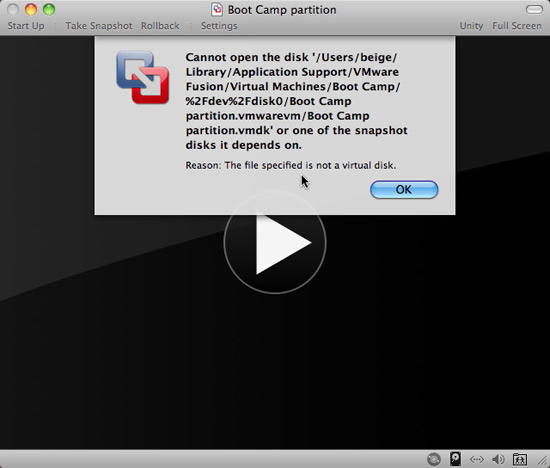Maintaining and Changing the MAC Address of a Virtual Machine When a virtual machine is powered on, VMware Workstation automatically assigns each of its virtual network adapters an Ethernet MAC address. MAC stands for media access control. A MAC address is the unique address assigned to each Ethernet network device. Programs such as Parallels Desktop, VMWare Fusion and VirtualBox allow you to create a virtual machine (VM), that runs on your Mac just like any other Mac app. The virtual machine uses software to. If you try to create a VM without using VM Unlocker, you will not see the macOS option as in the.
- Vmware Tools For Mac Vm
- Vmware Player For Mac
- Vm For Mac Free
- Vmware Vm For Mac Os
- Vmware Vm Machine Configuration
Vmware Tools For Mac Vm
Welcome to the VMware Horizon® Client™ for Mac documentation page. The documents on this page are designed to help you install, configure, and use Horizon Client on a Mac. To find the release notes, user guide, and installation and setup guide for your Horizon Client for Mac version, locate the version in the table of contents on the left.
In the VMWare vSphere Client interface you can search virtual machines by their names only. But in some cases it is necessary to find the specific VMWare virtual machine by its IP or MAC (NIC hardware) address.
It is easier to do it using the VMWare PowerCLI that allows youy to search by different virtual machine parameters.
Run the PowerCLI console and connect to your vCenter server or ESXi host using the following command:
Connect-VIServer vcenter-hq.woshub.com -User administrator
To find a virtual machine by its MAC address, use these commands:
$vmMAC='00:52:32:DD:12:91”
Get-VM | Get-NetworkAdapter | Where-Object {$_.MacAddress –eq $vmMAC } | Select-Object Parent,Name,MacAddress
As you can see, the command has returned the name of the virtual machine with its MAC address.
You can also search for a specific MAC address directly in the virtual machine configuration files (VMX) on the VMFS datastore. Connect to your ESXi host via SSH and run the command:
find /vmfs/volumes | grep .vmx$ | while read i; do grep -i '00:52:32:DD:12:91' '$i' && echo '$i'; done
If you have VMware Tools installed on your virtual machines, you can search by the IP address of the guest operating system. For example, you have to find a VM with the specific IP address. Use the following commands:
$vmIP='192.168.1.102”
Get-VM * |where-object{$_.Guest.IPAddress -eq $vmIP}|select Name, VMHost, PowerState,GuestId,@{N='IP Address';E={@($_.guest.IPAddress[0])}}|ft

If you know only a part of the IP address, use the following command:
$vmIP='192.168.”
Get-VM * |where-object{$_.Guest.IPAddress -match $vmIP}|select Name, VMHost, PowerState,@{N='IP Address';E={@($_.guest.IPAddress[0])}} ,@{N='OS';E={$_.Guest.OSFullName}},@{N='Hostname';E={$_.Guest.HostName}}|ft
The command will list the names and types of installed OSs of all virtual machines which IP addresses match this pattern.
VMWare Error: Unable to Access a File Since...
October 1, 2020Vmware Player For Mac
How to Enable and Configure SNMP on VMWare...
September 7, 2020Vm For Mac Free
Selecting the Number of vCPUs and Cores for...
August 18, 2020Vmware Vm For Mac Os
Configuring USB Devices Passthrough from VMWare ESXi to...
August 12, 2020Vmware Vm Machine Configuration
Match Windows Disks to VMWare VMDK Files
July 21, 2020